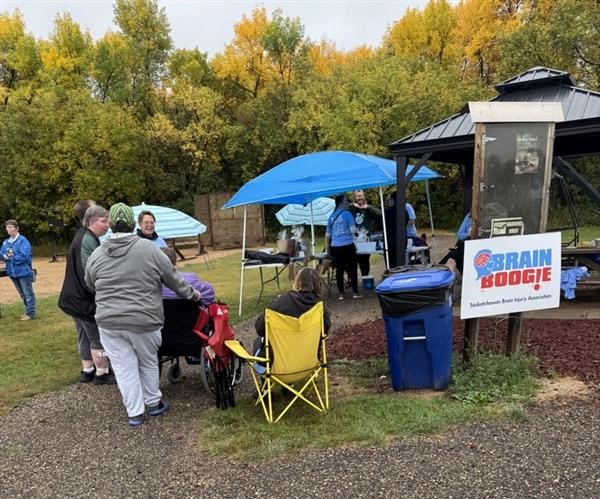The Saskatchewan Brain Injury Association’s annual Brain Boogie made its return to Estevan this weekend, bringing together survivors, families, and community members for a day of walking, fundraising, and connection.
Despite rainy weather, the event went ahead on Saturday morning. Organizers adjusted the schedule to take advantage of a break in the rain, ensuring participants could complete the walk before heavier showers set in.
“We cheated a little bit,” said Glenda James, executive director of the Saskatchewan Brain Injury Association (SBIA). “It looked like most of the people were there at around 10:30 when the rain cleared for a little while, so I said, ‘let’s just start now and go with the weather instead of the clock.’ They got a little wet at the end of the walk, but they got it in.”
The Estevan Brain Boogie was first organized last year by local resident Jennifer Kuchinka, who has lived with a brain injury for 15 years. She said she wanted to bring the event to her community after attending in Regina.
“We went for a shorter walk than last year, but it was still good. We got lots of support from people,” said Kuchinka.
Kuchinka said that support included community donations of raffle prizes, which contributed to the day's success. For her, the most rewarding part has been the chance to connect survivors and their families.
“Just having a group of survivors for support and recognition in the community, and encouraging my family and friends to join, that’s been really good,” she said.
The Brain Boogie began 23 years ago in Regina, launched by Barb Butler, now president of the SBIA, who was a new brain injury survivor at the time. Since then, the event has spread to communities across Saskatchewan, with walks also taking place this weekend in Saskatoon and Prince Albert.
James said the funds raised support programs and retreats for people living with brain injuries. These retreats, held in major cities across the province, give survivors a chance to participate in workshops, connect with others who understand their experiences, and enjoy social activities like evening banquets. “If you don’t have a brain injury, you cannot understand how it complicates your life,” James said. “These retreats are really valuable because participants can share, learn, and just be understood.”
“As soon as they say, ‘oh, I can’t see,’ or, ‘I can’t hear, I need to move,’ they understand,” James added. “That’s what’s really valuable to brain injury survivors—to have chances to gather with other people.”
Donations to support the SBIA and its programs can be made online at sbia.ca. The Brain Boogie donation page remains open until the end of the year.
